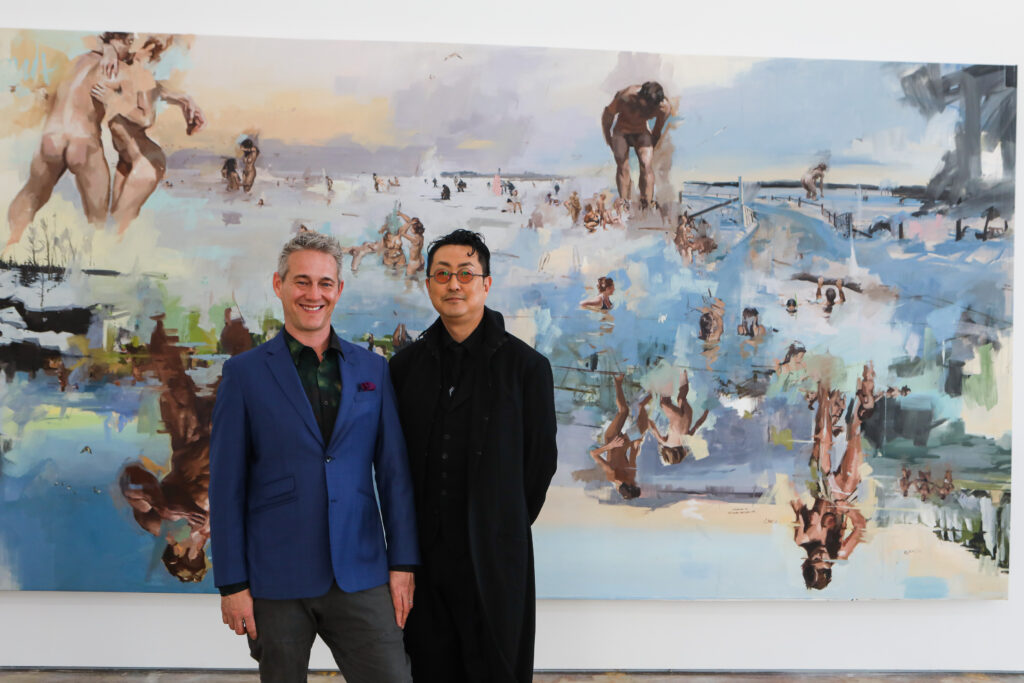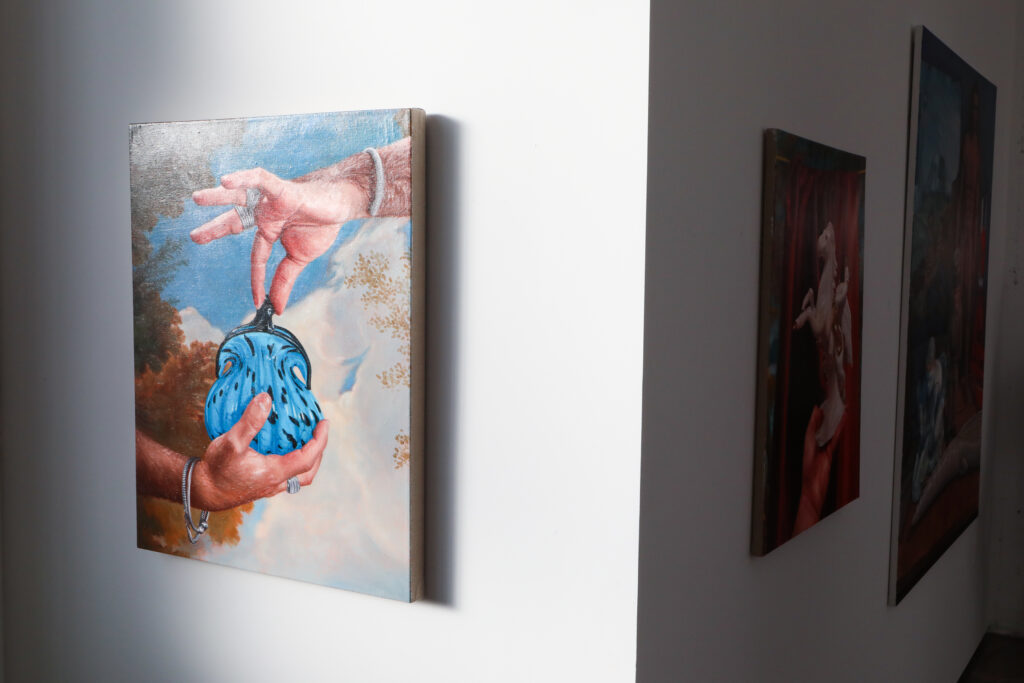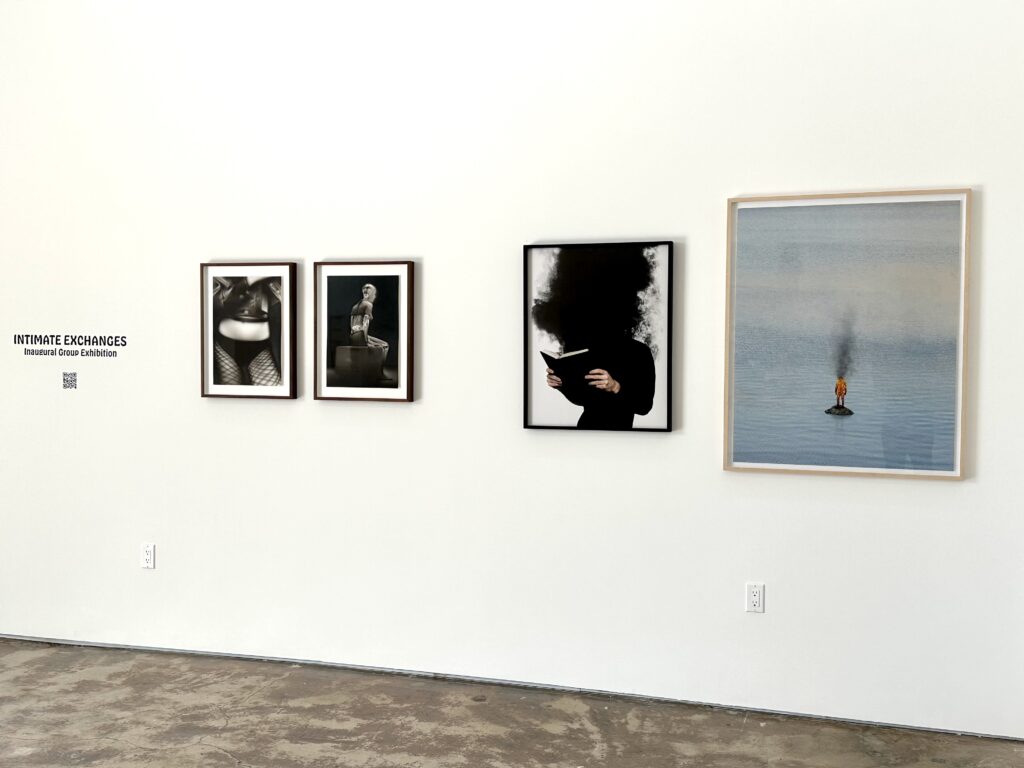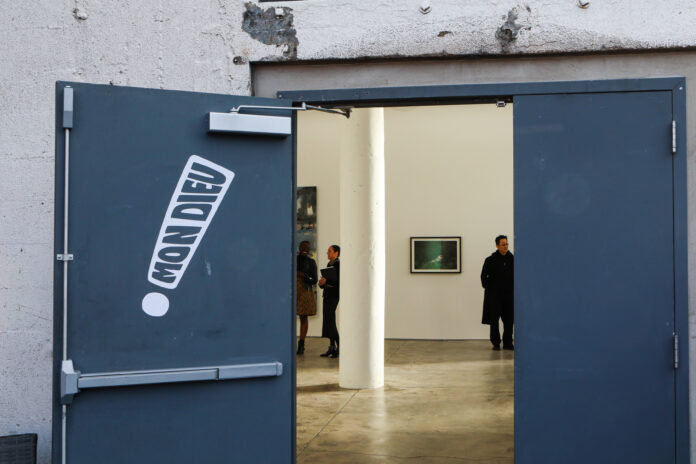Sharing a distinctive point of view for art, Spencer Walker (LA-based) and Juno Youn (Montreal-based) recently joined forces to launch “Mon Dieu Projects”, a passionate art gallery in the Mohilef Studios in LA. “Mon Dieu” the French translation of “My God” strives to surprise and move the local art scene with its curatorial selections and works. Here, we see what drives and inspires the founders, plus a few tips of how they turned an ugly experience into a learning lesson.
Tell me how you organize, plan, and prioritize your work.
Juno Youn: Running an art gallery is a little like the movie “Everything Everywhere All At Once”. I feel like Michelle Yeoh fighting the clock to get complete deadlines that collide together like splitting atoms. It is not an easy task when you are managing the expectations of artists, clients, and gallery staff. But I have been running an art gallery for two decades from Toronto, Montreal, and now in LA, so I have the experience of wisdom to prioritize to make sure it all gets done. Planning ahead to complete tasks in the limited downtime is key, but that is oftentimes not an option because when everything is a five-alarm emergency. But that is how the art business functions.
Spencer Walker: Google Drive and Dropbox are our life. It’s all about staying organized with files with artist works, CVs, artist statements, etc. so we are ready to follow up with a collector at a moment’s notice. We have built systems of checks and balances to make sure that we always meet the moment and complete each deadline. Juno and I have a daily check in where we go over the Mt Everest sized pile of tasks, and then we divide and conquer. Juno is savvy with the dark arts of social media while I am a professional writer who can knock out newsletters, client emails, and gallery copy. Together, we become a potent force far greater than the sum of our parts. That is Mon Dieu Projects.

Provide an experience in which you resolved a difficult customer inquiry or complaint.
J: I have been lucky that those difficult customers have been a rarity, which I know is not the industry norm. At the end of the day, art galleries are a service business and it is our job to satisfy the customer’s needs. Some clients can be extremely demanding, narrow-minded, and self-centered. But that comes with the territory when working with affluent clientele who often earned that lifestyle through those high standards. Sometimes they will demand an unreasonable discount on top of free framing and delivery charges. It becomes a nonstarter at a certain point. Whatever the issue is, I find that being diplomatic can solve most issues. However, our clients in my Montreal gallery have remained very supportive, helpful, and some even became friends like Spencer.
S: We make a point of working with honorable people on both the artist and collector side. But in our short time running Mon Dieu Projects, we had one prospective client who spent a lot of time discussing the work. It felt like a sale was imminent, but then they demanded so much of a discount that we would lose money and lower the artist’s price point irreparably. So, we turned down their lowball offer. But then this individual went around our backs and contacted the artist to buy work from them directly. Luckily, our artist declined their overtures and informed us of the skullduggery. We contacted this person and explained to them why this was inappropriate, explained our pricing and our razor-thin margins, and at the end of the day, they agreed to the original price with no discounts.

Please share with me an example of how you helped coach or mentor someone. What improvements did you see in the person’s knowledge or skills?
S: Mentorship is an essential part for any successful business. We need to prepare the next generation to take over and be better than we ever were. I count my past professional successes in TV writing on a few established writers that took an interest and time out of their busy days to critique my work and push me to become a better writer. I did the same for the writers assistants and interns I worked with and a few have gone onto become more successful than I ever was. And that is the plan with Mon Dieu Projects. We are still in startup mode, but when we hire staff for the gallery, our hope is we can mentor them to become successful gallerists of the future. And we will buy art from them…if we can afford it!
J: Paying it forward is the only way forward. I have been invited to give lectures at conferences and art schools. I hope that some of my hard-learned lessons will be heeded so they don’t make the very long list of mistakes I made along the way. But I also try to mentor my younger gallery staff at Galerie Youn. I have the good fortune that I work with very smart young adults Isabel Gelfand and Oriah Robichaud. Isabel has become something of a sales rainmaker who has developed a natural ability to put clients at ease and convince them they need to buy this painting. Oriah is young, but his ambition and work ethic make him an indispensable asset to my gallery. Now that I am spending part of my time in LA helping Spencer run Mon Dieu Projects, having a smart and reliable staff is everything. I know that Isabel and Oriah will accomplish great things.
What is the key to success when communicating with the public?

J: Consistency is the key ingredient in successful public relations. I make a point of taking the time to listen, consider all the possible answers, and then I respond clearly with the same answer I will tell everyone else. I will never lie, but I will choose to answer with the most positive take even on a situation that may not be ideal, say a damaged painting. I apply this to my personal life to. I am deliberate and honest, always.
S: Prompt responses are a key element of how we do business. My uncle who is a successful real estate developer stressed to me early the importance of responding to every call, email or text within 24 hours. Never leave someone hanging wondering whether you are blowing them off or are not important enough to respond to in a timely manner. We get a lot of emails from both clientele as well as artists interested in representation, vendors trying to win our business, and the occasional media inquiry. Mon Dieu Projects will get back to you!
Share an experience in which you successfully shared a difficult piece of information.
S: There is only so much available wall space in a gallery and too many artists with talent. Curating group exhibitions is an artform to make everything work together. And aesthetics is just one aspect because you also need to manage the egos of the artists who all feel they deserve a solo show. We had one artist who had talent, but her work did not fit with the rest of our group exhibition. Juno and I had to sit the artist down in person and explain why she was not going to be in this particular exhibition. We were honest with our reasons, explaining that there would be future shows, and that there could be a chance for a solo exhibition if she continued to hone their craft and expand her body of work. To our surprise, the artist didn’t take us hostage or throw coffee in our face. She hugged each of us and thanked us for being straightforward and not giving the runaround, and promised to blow our mind with what she paints next. And we cannot wait.
J: I have so many stories but here is one. I had this one artist whose talent eclipsed their time management. We had a solo exhibition planned a year ahead of time that I was already promoting to the public and specific collectors. But as the date of the solo show fast approached, he started citing personal reasons for me not being able to view the works in progress. I pride myself in helping artists conceptualize their work in the context of an exhibition in order to maximize sales. But this artist was not interested in my guidance and, by the time it came for their solo show, they did not have enough work to justify a solo exhibition, especially compared to the other artists I work with that would be ready. With a week to go before the scheduled opening, I was forced to scrap the solo show and replaced it with a group exhibition. We had the inventory of the latest works from various artists I represent who respected my deadlines. And it was fabulous with plenty of sales and happy artists. The show must go on!
Tell me about a recent experience you’ve had working with your hands.
S: No one can say that running an art gallery is purely a desk job. True, we do spend a lot of time at the desk writing emails and press releases. But I also spend a lot of time as the custodian, handyman, and art installer since we are a new gallery without staff. I spend a lot of time at Home Depot anyway doing home repairs and working in the garden. Now I do the same thing for the Mon Dieu Projects, picking up paint, power tools, and assorted screws to fix up the gallery. Every day I open the gallery, I set up our outdoor furniture, dust and clean the gallery glass, and keep it looking respectable for the clientele.
J: I do everything with my hands as an art dealer. There are few things more physically demanding than opening and unpacking a crate of shipped art. Our first exhibition installation we hired Big Tim Stephenson to handle the heavy lifting, but Spencer and I were his assistants throughout the process offering more than just our opinions on where to hang a painting and at what height. We held the ladder for Big Tim, got up on the ladder ourselves to paint the walls where the landlord missed a spot, and helped hang the massive 16’ x 8’ painting “Transitional Device” by Andrew Morrow. I needed a massage and a change of clothes after all that work!
Share an example of a time you had to gather information from multiple sources. How did you determine which information was relevant?
J: There is so much conflicting information out there on any issue. The art world is no different. Information silos can trip you up and lead to some BIG mistakes. You can’t just Google “How to launch a successful” gallery without getting a lot of nonsense probably written by ChatGPT. Using trustworthy sources of information is key to finding the right information. I am lucky that for Mon Dieu Projects, Spencer is an LA native with a trove of resources to call upon.
S: Starting a gallery in Los Angeles required a lot of fact-finding from all manner of sources. Juno and I met up with a number of influential people to get their pulse on how to do this correctly. We spoke to collectors and the chief curator at MOCA Los Angeles Clara Kim about the best areas for emerging galleries. I spoke in depth over many glasses of wine with a friend that once had a successful gallery. He walked me through the mistakes he made like being over leveraged with the hopes that I don’t make the same mistakes. Determining relevance of information comes down to trusting our gut, and taking the same “trust, but verify” approach Ronald Reagan took with the Soviets during the Cold War. We are only as good as our intel.

























